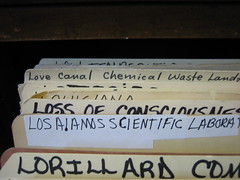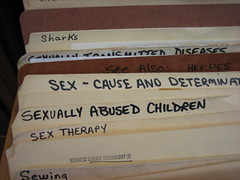It occurs to me that when I travel I do an awful lot of linking to Flickr pix. This time I’ve decided to actually include some of them right here, in case you’re like me and don’t follow links half the time. Part of my trips is always a certain amount of library evangelism. I always ask my hosts whether they use their local library and what they think of it. I was pleased to be able to tell my Baltimore host about the totally excellent pamphlet file and the Enoch Pratt Free Library, and extra happy that he found the idea as delightful as I did. Here are a few photos, click through for slightly more detail & others.
DOPA, you are on notice
I talked with the Library 2.0 gang about DOPA yesterday [updated to include link], trying to figure out strategies and talking points for helping librarians deal with the full court press that is this legislation + the media onslaught about the evils of social software. I learned a lot more about Second Life than I knew previously and came away feeling like I could go back to my libraries and make a good case for why they should pay attention to DOPA and what they’d be missing if it passed.
This is just all an intro to this “On Notice” image posted by Michael Stephens. Perhaps not as funny if you don’t already watch the Colbert Report, but I think you can get a lot of it via context.
DC Public
I’ll put up some pictures later but I’m using the wifi in DC Public before heading out to hang out with my pal Chris from Libraryola. Yesterday I went to a tasty and fun lunch with Dorothea and then had a great chat with Ron (who I met on MetaFilter) who works at the US Holocaust Memorial Museum Library. After the conference I also got to hang out with my friend Tom Hyry who was on the SAA Program Committee who is the reason I was in DC in the first place. I’ve got a list of libraries I’d like to hit in Baltimore and then I have to find a place to stock up on books for the trip home.
I have this to say about DC Public: it’s all true. I had been reading about the sorry state of the library system here for a while but I don’t think I’d ever been to the big downtown branch. It’s hot here, and dirty here. One bank of elevators isn’t working and I have yet to see a staff person who isn’t reading a book or idly surfing the web. There are a lot of people here, though they tend towards the middle-aged men demographic. There are no families, no older people that I’ve seen, and no people my age. This place is the place that time forgot. I had to go through a metal detector and empty my pockets before I could even come inside. I like being able to use the wifi but I only discovered it because I opened up my laptop, not because it’s advertised or publicized in any way. I’m the only person here using a laptop, I think in the entire library but I won’t be using it much longer because there is barely any air conditioning and the sweat is affecting my typing accuracy. The lobby smells like diapers and disinfectant. Everyone I have talked to that lives in DC doesn’t use the library, they either buy books or find a way to use the suburban libraries or ones at the local schools. This is a big problem, and it’s still unclear what is being done to straighten it out.
my SAA talk, notes and photos
I gave my talk about collaborative information systems and blogs generally at the closing day of the SAA conference yesterday. Here are my slides: Capturing Collaborative Information: News, Blogs, Librarians, and You. It’s pretty picture-heavy — thank you Flickr — but you can click on the “printable version” link in the last slide to see my notes. You can also see a few pictures in my Flickr photostream under the saa tag. I went to another discussion on the link between archives and justice that I’ll be writing up later today as well as tracking down some of the reports from people who blogged about my talk yesterday.
on (tough) decision making
Today at my drop in time I got snarled at by a student. She is an older woman [in her 70’s but her Ebay profile says she’s 59] who got a new-to-her laptop running Windows 98 which she is learning to use with her digital camera. I’ve been trying to nudge her towards newer technology but she’s tight with money and so we persevere with what she has. She forgets things and so every time I show her how to, for example, move all the images off of her calendar, we have to write it down on a piece of paper. She almost always loses the piece of paper, so we go over it again. She always asks me how I’m doing, listens to the answer, and sometimes brings things in for me: an odd bit of jewlery; a tupperware container full of grapes; an adjustable wrench.
She talks to herself while she works. It’s very distracting to me and I’ve tried to suck it up. It’s a big lab and usually we can spread out, but people have been complaining that it’s tough for them to work with her always muttering. I’ve asked her to stop and she sort of waves her hand at me, claims she’s not talking, and usually quiets down. Today, I asked her several times and the last time she just snapped “Why should I have to be quiet when you’re talking to everyone too? I’m just whispering over here, hardly talking at all, you should get cotton for your ears if it bothers you so much!” I was quiet, and went to talk to her later, explained that there were other people besides me who were distracted, and gave her a few options: move to a far corner of the lab, keep her voice down so that it doesn’t distract people, work from home and interact with me via email. She didn’t like any of these choices much, but that’s what the choices are unless we can think of better ones. I’m not sure me playing Iron&Wine at high volumes would help, but it might not hurt….
The reason I’m bringing this up is because I read T. Scott’s post about decision making and what it means to be a manager. While of course we’d like to be able to please everyone with the acute insight of our decision-making capability, sometimes this is just not going to work. Sometimes two positions conflict absolutely, and your job as a manager is to make a choice, a choice that will piss someone off.
I think of this in terms of the signs in the library that so many people have Flickred. While I appreciate that it’s time to put the shushing librarian image to bed, we still have to have a response to people who show up at the library with an expectation of quiet. If the library isn’t quiet anymore, we need to communicate that, not just say “thanks for your feedback” and hope that person doesn’t complain to us anymore. If people on cell phones are annoying other people, we need to make a choice, not just expect the problem to go away with the one loud talker. I think it’s perfectly reasonable to have quiet spaces in the library, or no cell phone spaces in the library, or “this is not a good place for your soda” places in the library. Usually our libraries are big enough that we can have those spaces as well as a noisy space, and a phone-talking space, and a soda drinking space. But if we can’t, if we have to make a choice, I would hope that we could make that choice openly and transparently and clearly. Every space can’t be everything to everyone. Good management is about making and communicating decisions about resources and priorities.
[Y]ou should assume that every decision will be criticized and misunderstood. This is an aspect of change management that I haven’t seen discussed much in the libraryland blogs. I believe in having as open, transparent and participative a decision-making process as possible. I believe in consensus building. But “consensus” doesn’t imply unanimity of opinion. The quest for complete agreement, the desire to adjust to everybody’s concerns in making decisions can paralyze an organization.

